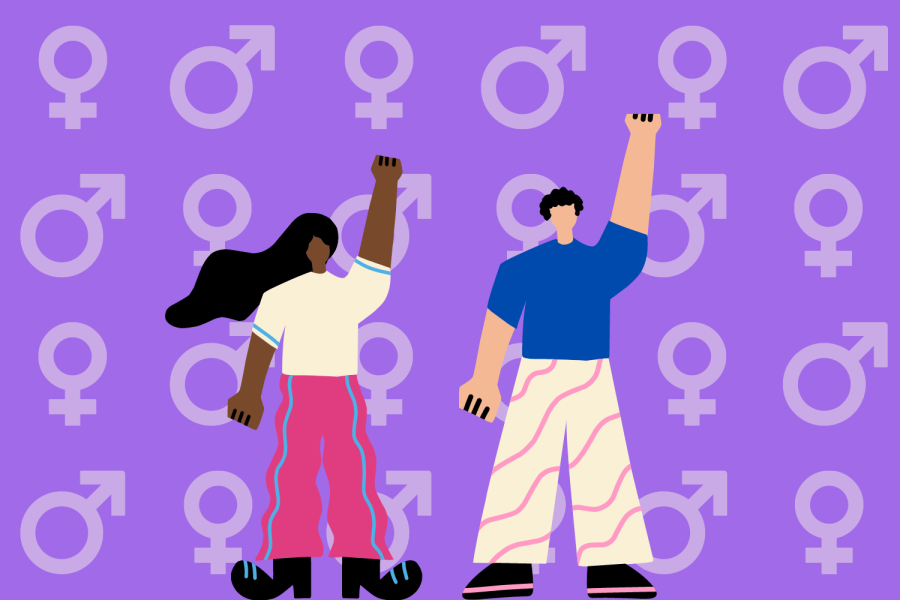I was scrolling through my newsfeed last fall when I saw that Kim Kardashian was named the 2023 GQ Man of the Year. My initial thought was that this title is a cool breakaway from the magazine’s norm. However, after reading the article itself and perusing other stories in response to this news, I didn’t see the selection of a woman for this honor as empowering as it had seemed.
Each year, GQ Magazine publishes a “Men of the Year” issue and hosts an associated event. Typically, the magazine honors both men and women to include in this issue — touting the award as a “celebration of the year’s most compelling and successful people in popular culture.” Honorees from previous years include Tom Cruise, Leonardo Dicaprio and Tom Holland.
Rather than being a win for feminism and representing the success of women, I viewed this decision as reinforcing gender roles and the patriarchy. The decision to select Kardashian shows a subconscious bias that revolves around what and who people view to be powerful and influential. While the front page of the magazine states “Men of the Year issue starring Kim Kardashian,” the website further celebrates Kardashian as “tycoon of the year.” Rather than highlighting Kardashian’s contributions to fashion, feminism or beauty, her powerful business and what she learned from her father was the primary focus of this issue that mainly focuses on the “Man of the Year” title. When GQ puts a woman on the cover and calls her both “tycoon of the year” and “man of the year,” it suggests that a successful woman with a powerful business empire must be like a man.
This is not the first year that a woman has graced the cover of GQ magazine. In 2005, Jennifer Aniston became the first woman to be part of this annual saga. She was, however, given the title of “Woman of the Year.” This title, to me, is a much better celebration of female honorees. Honoring women for their successes as “Woman of the Year” avoids the harmful comparison of a powerful woman to a man and instead celebrates them for who they are. Later, in 2010, Scarlett Johansen was honored in the issue — but instead of titling her as “Woman of the Year,” she was given the title “Babe of the Year.”
Similarly, in 2019 Jennifer Lopez was named “Icon of the Year,” and in 2020, Megan Thee Stallion was pictured as “Rapper of the Year.” While it’s refreshing to see women represented in a male-dominated entertainment industry, we must question why the only measure of success for a woman is how well she replicates masculine norms.
Many responses to Kardashian’s cover scrutinized what being “the man” meant when applied to women like Kardashian. In response to the title, Good Morning America and ABC News published articles that opened with “Kim Kardashian is the man — of the year, that is.” Similarly, CNN published an article that explicitly said, “Kim Kardashian is the man.” The use of these references when referring to women who have excelled in their industry perpetuates the idea that the highest form of compliment of a woman’s success is to incorporate characteristics associated with men. The archetype of the man, they are telling us, is the sole standard for success in human society.
The media’s response to the cover forced me to think critically about the vocabulary I use when identifying and talking about successful women. When I first read the GQ article, I described Kardashian as a “girlboss,” a pop-culture term that refers to a self-made, successful and powerful woman. However, upon further reflection I found this to be a similarly problematic phrase; when referring to an influential woman, I specified her gender first, therefore automatically making a supposedly gender-neutral term like “boss” masculine. In sociology, male default thinking is when certain words are unconsciously associated with men. This phenomena encapsulates the connotations that words like “powerful” and “boss” can have.
As students at an elite university with the time and resources to debate issues of bias and sexism, it can be easy to ignore the real-life implications of how society views working women. More likely than not, many of us as future Vanderbilt graduates will face gender disparities when joining the workforce, particularly members of gender minorities. Harsh realities await us; according to Forbes, on average, women earn 82 cents to a man’s dollar — and this inequity is compounded by other factors like race, sexuality and ability. Take, for example, rural, Black and Hispanic women who make only 56 cents to a white man’s dollar. Further, out of the 505 Fortune 500 CEOs, 53 are women, and only one of them is a Black woman. While this number is alarmingly low, media coverage actually lauds this as a major congratulations: women finally make up 10% of Fortune 500 CEOs!
As students at an elite university with the time and resources to debate issues of bias and sexism, it can be easy to ignore the real-life implications of how society views working women. More likely than not, many of us as future Vanderbilt graduates will face gender disparities when joining the workforce, particularly members of gender minorities.
For those of us interested in education leadership, these discrepancies persist in college administrations as well. A report from the Eos Foundation reports that of the 130 public and private R1 universities, which are top universities for research and development, only 22% of them had a woman holding the institution’s top position. Vanderbilt is part of the 78% with a male chancellor. Additionally, of Vanderbilt’s 11 leaders, four are women.
It is important to understand and identify areas where sexism and bias are at play, especially as students prepare to enter a male-dominated workforce. Our time at school helps us be able to speak up and debate the perpetuation of harmful stereotypes, such as referring to influential women as “the man.”
GQ’s portrayal of women only reinforces gendered conceptions of “power,” which has led to the staggeringly low representation of women in positions of dominance. This cover continues to perpetuate stereotypes and norms about who holds influential positions that impact women every day. When the “Man of the Year” title is bestowed upon a woman because she is influential in her field, this continues to perpetuate that only men belong in top positions. This article instills the idea that a powerful woman more resembles “the man” than other women. Indeed, women occupy top positions across all industries, but it is worth acknowledging that these jobs are still male-dominated.
Magazine covers can play a crucial role in defying gender norms. But, this can be done without naming influential women as “man of the year.” To me, there is nothing wrong with the conventional choice to celebrate breakout men and feature them on a GQ cover or celebrating women with their own cover with magazines, like Variety, that puts out a “Power of Women” issue. However, with these in mind, a better way to move past these norms is for these magazines to have editions honoring “people of the year.” An example of this is Time Magazine’s “Person of the Year” issue. In 2023, Taylor Swift received this title — and respectably, the magazine did so without comparing her to a man and celebrating her in the article for the powerful businesswoman and singer that she is.
Kim Kardashian isn’t a “girlboss” or “the man” because she has established her place as a powerful figure. It’s important to recognize that women can be successful and don’t have to be compared to men.








